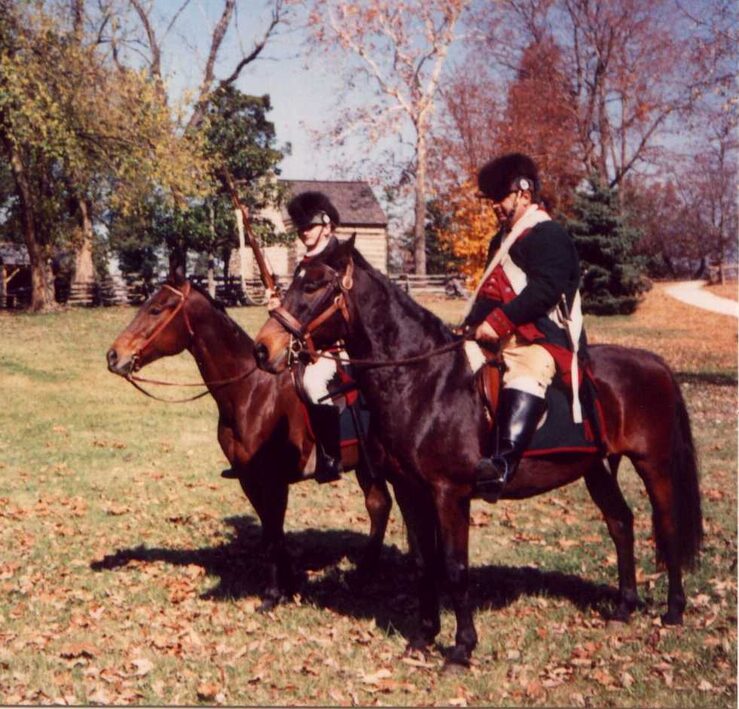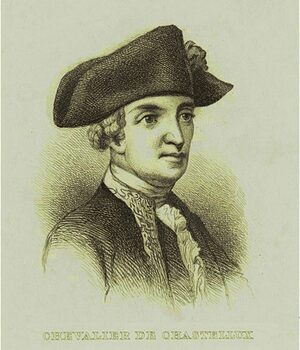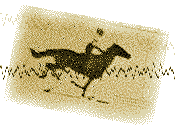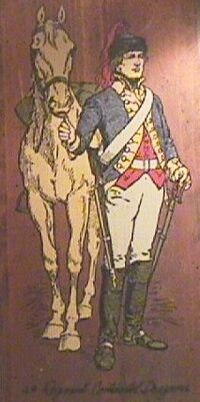

The MARQUIS De CHASTELLUX OF FRANCE
and COLONEL STEPHEN MOYLAN,
COMMANDER,
4TH CONTINENTAL LIGHT DRAGOONS

Marquis de Chastellux, Francois J.
TRAVELS IN NORTH-AMERICA,
IN THE YEARS 1780, 1781, and 1782
The bibliography "U.S.-iana" calls this "the first trustworthy record of life in the United States." Chastellux presents a panoramic view of America, her customs and leaders in graceful, fact-filled prose.
LC 67-29046 London, 1787 ISBN: 0405011350 2vols.
In November of 1780, the Marquis de Chastellux visited General Washington's Camp at Morristown in preparation
for the active participation of the French Army and Navy in the American Revolutionary War.
This extract from Chastellux's Travels in North America, Vol I, pp141-173 was reprinted in the Biography of Stephen Moylan, pp 110 - 113.
The biograpy of STEPHEN MOYLAN
Muster-Master General
Secretary and Aide-de-Camp to Washington
Quartermaster-General
Colonel of Fourth Pennsylvania Light Dragoons and
Brigadier-General of the War for American Independence
The First and the Last President of the
Friendly Sons of St. Patrick of Philadelphia
COPYRIGHT, JANUARY 16, 1909
By MARTIN I. J. GRIFFIN
The reader will perceive that it is difficult for me to quit General Washington:
Let us take our resolution briskly then, and suppose ourselves on the Road.
Behold me travelling with Colonel Moylan, whom his Excellency had given me,
in spight of myself, as a companion, and whom I should have been glad to have
seen at a distance, for one cannot be too much at one's ease in travelling. In
such situations, however, we must do the best we can. I began to question him,
he to answer me, and the conversation gradually becoming more interesting, I
found I had to do with a very gallant and intelligent man, who had lived long in
Europe, and who has traveled through the greatest part of America. I found him
perfectly polite; for his politeness was not troublesome, and I soon conceived a
great friendship for him. Mr. Moylan is an Irish Catholic; one of his brothers (Francis) is Catholic Bishop of Cork, he has four others, two of whom are merchants, one at Cadiz, (John Moylan) the other (James Moylan, Commercial Agent) at L'Orient; the third is in Ireland with his family; and the fourth (Richard?) is intended for the priesthood.
As for himself, he came to settle in America some years ago, where he was at first engaged in commerce; he then served in the Army as Aid de Camp to the General,
and has merited the command of the light cavalry. During the war he married the
daughter of a rich merchant in the Jerseys, who lived formerly at New York, and who now resides on an estate at a little distance from the road we were to pass the next day. He proposed to me to go and sleep there, or at least to take dinner;
I begged to be excused, from the fear of being obliged to pay compliments, of
straightening others, or of being myself straightened; he did not insist, so that I
pursued my journey, sometimes through fine woods, at others through well
cultivated lands, and villages inhabited by Dutch families.
Chastellux and Moylan remained at Morristown over night, "where the goodness of General Washington and the precautions of Colonel Moylan had procured entertainment at the inn of Mr. Arnold." The next morning they left Morristown. Some miles from thence, we met a man on horseback, who came to meet Colonel Moylan with a letter from his wife. After reading it, he said to me, with a truly European politeness, that we must always obey the women; that his wife would accept of no excuse, and expected me to dinner; but he assured me that he would take me by a road which should not be a mile out of my way, whilst my people pursued their journey, and went to wait for me at Somerset Court-house. I was now too well acquainted with my Colonel, and too much pleased with him, to refuse this invitation; I followed him, therefore, and after crossing a wood, found myself on a height, the position of which struck me at first sight. I remarked to Colonel Moylan, that I was much mistaken if this ground was not well calculated for an advantageous camp; he replied, that it was precisely that of Middlebrook, where General Washington had stopped the British in June, 1777, when Sir William Howe was endeavouring to traverse the Jersey to pass the Delaware, and take Philadelphia.
It is here that Colonel Moylan's father-in-law has fitted Up a little rural asylum, where his family go to avoid the heats of summer, and where they pass whole nights in listening to the song of the mocking bird for the nightingale does not sing in America.
We soon arrived at Colonel Moylan's, or rather at Colonel Vanhorn's his father-in-law. This manor is in a beautiful situation. It is surrounded by some trees. The approach is decorated with a grass plot, and if it was better taken care of, one would think ones-self in the neighborhood of London, rather than in that of New York. Mr. Vanhorn came to meet me; he is a tall, lusty man. near sixty years of age, but vigorous, hearty, and good humoured; he is called Colonel from the station he held in the Militia, under the English Government. He resigned some time before the war: he was then a merchant and cultivator, passing the winter at New York, and the summer in the country; but since the war he has quitted that town, and retired to his manor, always faithful to his country, without rendering himself odious to the English, with whom he has left two of his sons in the Jamaica trade, but who, if the war continues, are to sell their property and come and live with their father. Nothing can prove more strongly the integrity of his conduct, than the esteem inwhich he is held by both parties. Situated at ten miles from Staten Island, near to Rariton, Amboy and Brunswick, he has frequently found himself in the midst of the theatre of war; so that he has sometimes had the Americans with him, sometimes the English. It even happened to him once in the same day, to give a breakfast to Lord Cornwallis and a dinner to General Lincoln. Lord Cornwallis, informed that the latter had slept at Mr. Vanhorn's, came to take him by surprise; but Lincoln, getting intelligence of his design, retired into the woods.Lord Cornwallis, astonished not to find him, asked if the American General was not concealed in his house: "No," replied Mr. Vanhorn, bluntly. "On your honour?" says Cornwallis. "On my honour, and if you doubt it, here are the keys, you may search everywhere." "I shall take your word for it," said Lord Cornwallis, and asked for some breakfast; an hour afterwards he returned to the army. Lincoln, who was concealed at no great distance, immediately returned, and dined quietly with his host.
The acquaintance I made with Mr. Vanhorn being very prompt and Cordial, he conducted me to the parlour, where I found his wife, his three daughters, a young lady of the neighborhood, and two young officers. Mrs. Vanhorn is an old lady, who, from her countenance, her dress, and her deportment, perfectly resembled a picture of Vandyke. She does the honours of the table with exactness, helps every body without saying a word, and the rest of the time is like a family portrait.
Her three daughters are not amiss: Mrs. Moylan, the eldest, is six months advanced in her pregnancy; the youngest only twelve years old. but the second is marriageable. She appeared to be on terms of great familiarity with one of the young officers, who was in a very elegant undress, forming a good representation of an agreeable country squire; at table he picked her nuts for her, and often took her hands. I imagined that he was an intended husband; but the other officer, with whom I had the opportunity of conversing as he accompanied us in the evening, told me that he did not believe there was any idea of marriage between them.
I mention these trifles only to show the extreme liberty that prevails between the two sexes, as long as they are unmarried. It is no crime for a girl to embrace a young man; it would be a very heinous one for a married woman even to show a desire of pleasing. Mrs. Carter, a handsome young woman, whose husband is concerned in furnishing our army with provisions, and lives at present at Newport, told me that going down one morning into her husband's office, not much decked out, but in a rather elegant French undress, a farmer of the Massachusetts' State who was there on business seemed surprised at seeing her, and asked who that young lady was. On being told "Mrs. Carter." "Aye!" said he, loud enough for her to hear him, "A wife and a mother, truly, has no business to be so well dressed."
At three o'clock I got on horseback with Colonel Moylan and Captain Heard, one of
the young officers I had dined with. He is in the light cavalry and consequently in Colonel Moylan's regiment. At four o'clock I set out, after separating, but not without regret, from the good Colonel Moylan.

Contact Us

Thank you for your interest.
Email us at:iv_dragoon@email.comor sign the guestbook and make your presence known.
